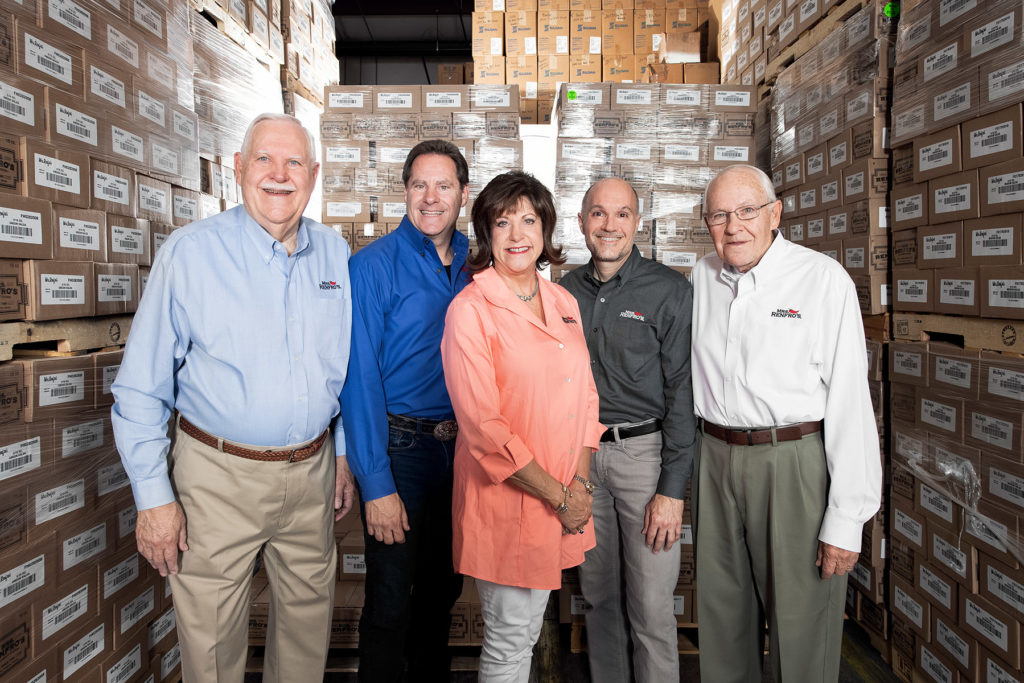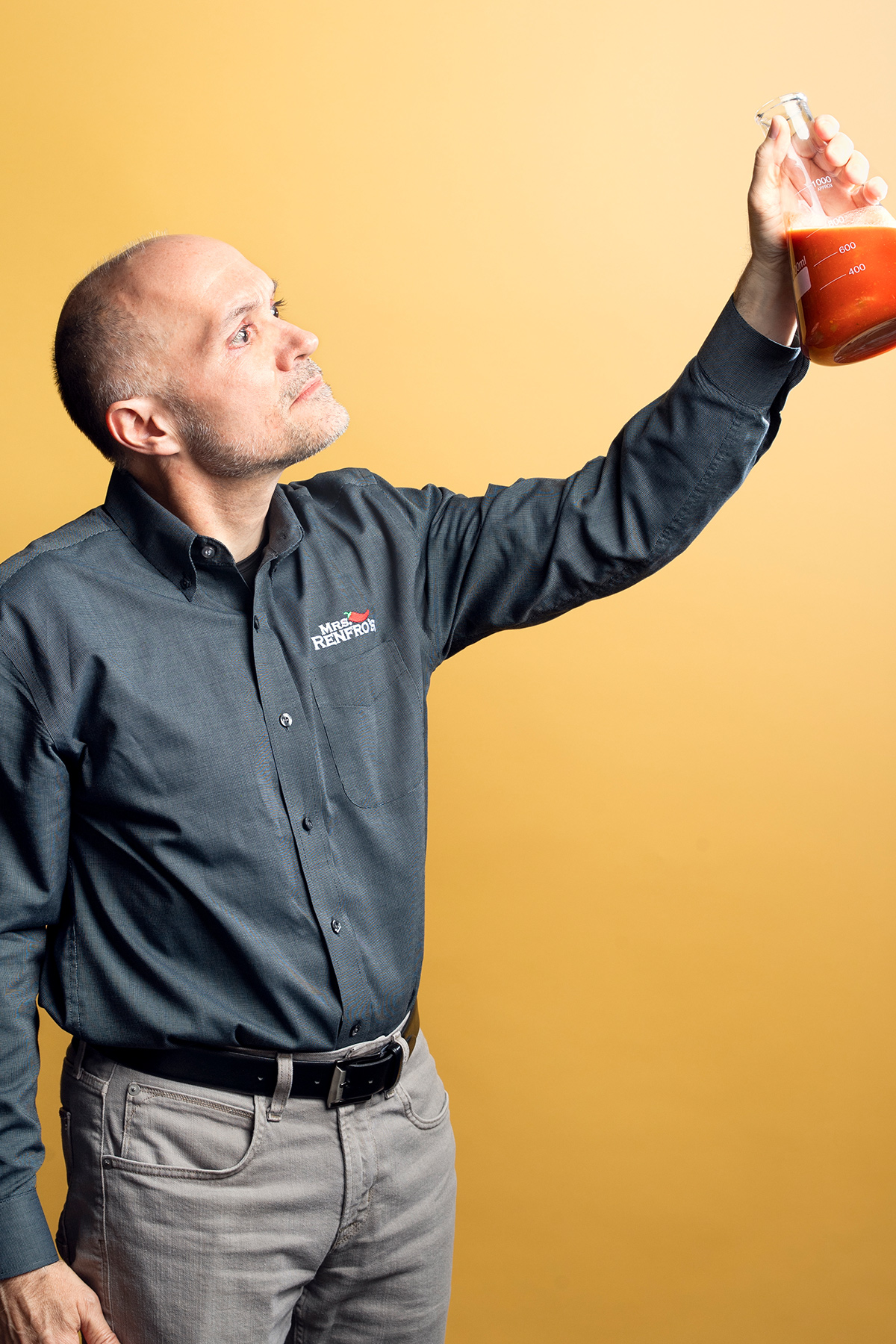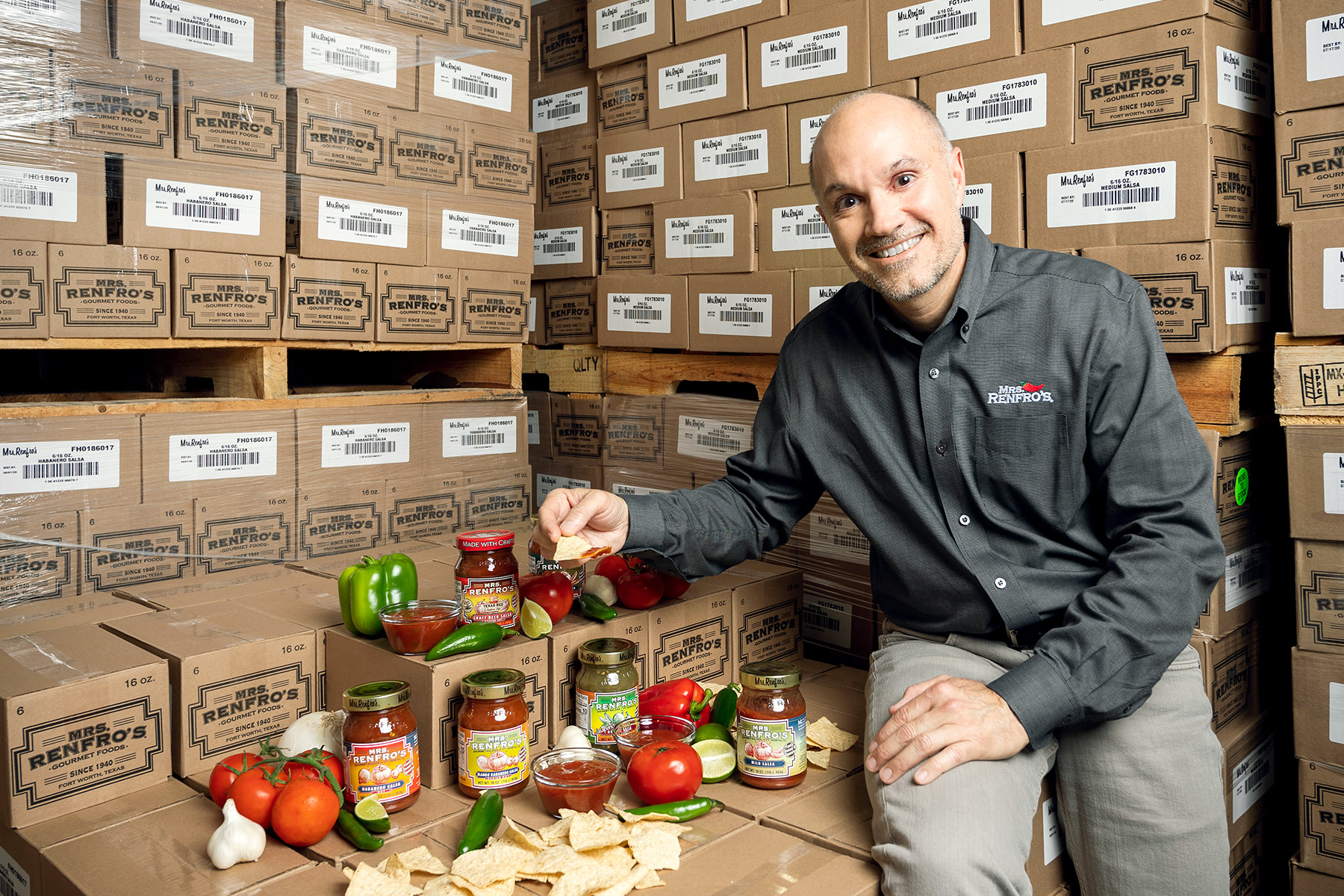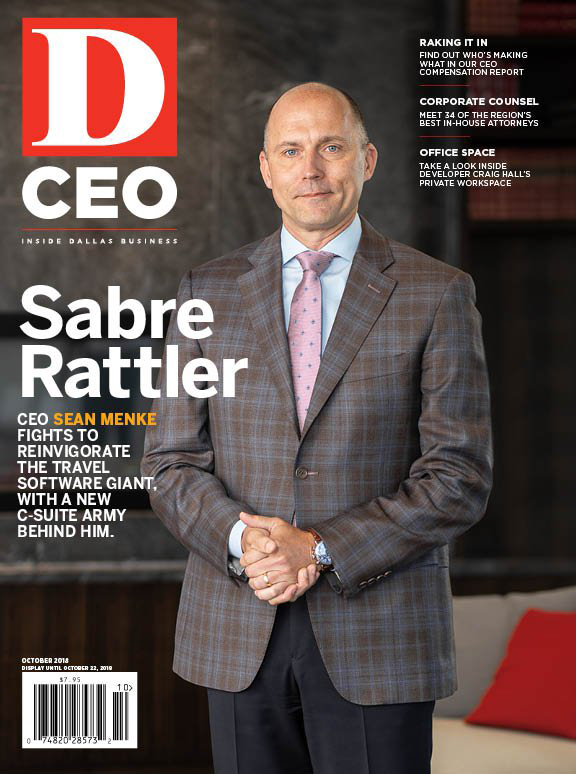“A happy sound—jars clinking together,” beams Doug Renfro as he dons gauzy hair and beard nets. The production lines are cranking as the 55-year-old Renfro morphs into tour-guide mode, his natural eagerness and easy humor revved up a notch, even though he has performed this routine countless times.
Doug Renfro is president of the family-owned and -operated Renfro Foods, launched in a Fort Worth bungalow 78 years ago by his paternal grandparents, George and Arthurine, as a spice and coffee distributor. Now housed in a sprawling acre of new buildings attached to a century-old edifice, it is the nation’s ninth-largest salsa brand, with $22.5 million in sales last year and $25 million projected for 2018. That’s substantially up from $3.8 million when Doug joined in 1992.
“We don’t always agree, But we talk through every situation.”
Becky Renfro Borbolla
The Cowtown building at 815 E. Stella St. has undergone countless renovations through the decades. Where a Model-A crankshaft once rotated gears on an industrial cabbage chopper for the family’s Dixieland-brand Chow Chow relish and bottled six jars a minute and hand-labeled, thousands of salsa jars now whir by on a high-tech line. The jars are robotically pulled from cases, sanitized, filled, capped, cooled, then labeled and boxed.
A nearby production line ends with workers still manually packing cartons of picante sauce for a Tex-Mex restaurant. They move with a practiced, rhythmic deftness and, somehow, no glass jars cascade onto the floor.
This particular order is part of the company’s “co-pack” or private-label business, which accounts for 35 percent of its revenue. Mrs. Renfro’s brands—named for Arthurine, who worked in the business for years, keeping the books—account for 50 percent. The remaining 15 percent comes from food-service bulk sales.
Despite the company’s success, Renfro says you can’t please everyone. “It’s critical to remember that half-a-million people love an item,” he says, “when one person emails you that it tastes like ‘vomit in a jar’ and tells you that you should be ashamed of yourself.”
Family Dynamics
The nondescript Renfro Foods complex has grown to take up much of a block in an inner-city neighborhood, across Interstate 35W and a few blocks from Fort Worth’s downtown. One friendly but stubborn resident refused to sell his home but allowed the Renfros to build around him. They gave the retired railroad worker a key to the gate that enclosed both his property and theirs, until he finally moved on four years later. The episode speaks volumes about this low-key, patient family.
“We’re not screamers,” Doug explains, when asked how the multi-generational business achieved its longevity without painful rifts, feuds, or other pitfalls that often plague family enterprises.
As an example of how they work together, Doug says he can call an idea from his Uncle Bill “idiotic.” Or Bill could dismiss an impractical epiphany of Doug’s as similarly unhinged. Then both would go out to lunch together as if nothing happened, Doug says. His own father, Jack, is a bit more sensitive, he allowed. “We don’t always agree,” said Becky Renfro Borbolla, Bill’s daughter. “But we talk through every situation.”

Luckily for Renfro Foods, there has been no jockeying for positions or rivalries. Doug’s father, Jack, 81, hated sales but enjoyed running the production lines. His uncle, Bill, 83, who holds the chief executive seat, always enjoyed sales, accounting, and expanding the product line, until he and Jack reduced their roles in recent years to weekly visits to the office.
Becky, who worked in the oil industry after college, has a flair for office management, running accounts receivable and payable, logistics, and much of the export business. She’s currently completing a two-year stint as chair of the Specialty Food Association, a major industry group that stages food shows in New York and San Francisco.
James Renfro is Bill’s son, but he takes after Doug’s father Jack in many ways. Both were rodeo competitors, both are at home supervising and innovating production, and both spend their off hours working on their respective farms. Doug is more similar to Bill. He’s comfortable meeting scores of prospective customers at trade shows, giving talks to industry and civic groups, and being the public face of Renfro Foods. Both are adept at accounting.
A ‘Can-Do’ Guy
Doug Renfro seems to have been destined to run the family business. But he wanted no part of the condiment industry when he entered the University of North Texas as a freshman. Instead, he hankered to be a saxophone player or concert pianist. On his very first day of classes, however, he realized “800 students were better than me—and maybe there’d be jobs for three of them.” He switched his major to business, graduated magna cum laude, and was looking for a job on Wall Street as a stock broker. “But Morgan Stanley didn’t come to UNT to hire,” Doug says. One of his professors recommended him for a job at Ross Perot’s old company, EDS, and the corporate world beckoned this self-described “Haltom City, Southern Baptist redneck.”
“Doug was a typical EDS hire in that he was a ‘can-do’ guy,” recalls John W. McCain, who was then in sales at EDS and is today the chief executive of NTT Data, which acquired Perot Systems. Renfro’s job was to determine the cost to EDS of data contracts that McCain was trying to sell. “Doug was easy to work with. You could totally count on him. He had a good following [of admirers], then and now.”
Doug got married, pursued his MBA at Southern Methodist University, and put in 60 to 70 hours during the week in EDS’ finance department. After several years, he had a team of MBAs and CPAs working under him, earned good money, and expected to see his salary double to the six-figure range—excellent remuneration for a 20-something in the late 1980s.
He enjoyed the intense work atmosphere and frequent travel, but fatherhood took a lot of the fun out of it and tempered his corporate ambitions. At the same time, he found the work becoming more mundane. By 1991, he was ready to move on. “I’m action-oriented. I want to create. I want to be the controller of my life,” he says.
With no management openings in the family business, Doug became an agent for Northwestern Mutual Life Insurance Co. He liked the freedom and the ability to create his own destiny, at 100 percent commission. But there was no safety net, and he had a family to support. After about a year, he abandoned the realm of whole, term, and disability policies when, he jokes, “my income was slashed to the point where I could rejoin the family business.”
Bill, who ran the day-to-day operations back then, wasn’t sure it would work out. “I was surprised he wanted to work with us. We made a place for him and, right off, I asked him to do something. But he got someone else to do it,” says Bill, his tone somewhere between stern and pique, even 26 years later. “‘Doug,’ I told him. ‘This is a small company and we’ve got to do these things ourselves.’”

Becky, now a vice president, like her brother James, also had questions about Doug’s return. “If you had asked me years ago I would say I didn’t think that Doug, James, and I would be running the business,” she says. “We all started at the bottom. None of us were given titles or stock in the company until we were here for a few years.”
After Doug’s initial misstep, he got it, filling in where he was needed, taking on more responsibilities, and quietly developing new products to expand the line. He formulated new salsa varieties, black bean and habanero, both of which caught on big. That encouraged Bill to suggest that Doug create a peach salsa. Up until then, the Mrs. Renfro’s brand had just one green sauce and three reds: mild, medium and hot “picante.” Doug later came up with chipotle corn and roasted salsa, and also updated Mrs. Renfro’s barbecue sauce, re-engineering it without artificial color, gluten, or high-fructose corn syrup.
Learning From the Giants
Those who know Doug Renfro likely will comment on two things: his sense of humor and his ability to manage numerous chores. “It helps being ADD with a bit of OCD,” he jokes.
Doug was hired as the company’s controller, but soon began performing duties of a company president, meeting with suppliers and customers and bringing strategy to operations. For example, the company had no budget process. “We figured what the numbers should look like. It sounds arrogant, but we were winging it.”
A major hurdle was convincing the older generation to accept a radical redesign of the plain white label that had single-color lettering. This gave the line a homemade, farm-stand look—a 1940s farm stand, Doug felt. He had prototypes drawn up by a local graphic artist who crafted a distinctive label with a woodblock illustration and colors that would brighten a grocery shelf. His cousins James and Becky agreed with the switch.
“We knew we had to update the look if we were to continue to grow into new markets,” Becky says. “Jack was more on board than my dad; he really liked the white labels.” Bill worried that major customers had come to rely on the old look, and that sales might sour, but he went along in the end. And at trade shows soon after, Bill was surprised to find the same people who had praised the consistent look of the old labels now swooned over the improved packaging. “As soon as we had the new label design, we immediately got into supermarkets in the Northeast,” Becky says.
Another big change came when Dan Fore, sales director and the only non-family executive at Renfro Foods, questioned the ongoing use of artificial preservatives. Bill and Jack had been told in the ’70s that it was necessary, Doug says. “Turns out if you cook at 198 degrees Fahrenheit and have a pH below 4.2, three’s no need for preservatives.” There was initial push-back internally, but Doug pointed to industry best practices. “I always believe in letting the huge companies do the research,” he says. “Did we honestly think Campbell Soup’s Pace and Frito-Lay’s Tostitos didn’t test all this thoroughly?”
Weathering Storms
Doug and his cousins have survived a number of challenges that could have ruined a less cohesive group. There was the Spanish customer who simply disappeared just as his large order arrived by sea. (The family found another customer to take the products, with a 15 percent markdown.) There was a massive product recall, due to the possibility of metal shavings in a key ingredient. Although the Food & Drug Administration confirmed there was no evidence that Renfro Foods received any of the contaminated ingredient, every jar from a production lot had to be pulled and destroyed. No one was harmed—save the Renfros. Many of the biggest supermarket chains have a policy of not ordering a recalled product for a year, even though the fault was with the supplier.
“Turns out, if you cook at 198° Fahrenheit and have a pH below 4.2, there’s no need for preservatives.”
Then came the bankruptcy of its biggest customer For years, Renfro Foods handled production for another salsa company. “We supplied everything they sold,” Doug says. Shipments of the customer’s grocery and fancier gourmet gift lines grew to the point where the co-packing orders amounted to nearly 33 percent of Renfro’s total revenue.
“We never wanted this to happen, but if you turn down volume with a co-pack customer, you are shoving them into the arms of your competitor. Hard to do.” The customer was a multi-generational family business like Renfro Foods, but one less hands-on and far less fiscally rigorous, Doug says. “They were past due for years. We tried to rein them in, but they’d get back out there.”
The Renfros knew they were in trouble when the customer made a rare request: a face-to-face meeting, with lawyers from both sides present. “I Googled their attorney and found his specialty was bankruptcy,” says Doug. He immediately got a recommendation for a well-regarded bankruptcy lawyer to represent Renfro interests: Bobby Forshey of Fort Worth’s Forshey & Prostok. “At the meeting, the customer announced it needed to file Chapter 11, but understood we wouldn’t want to keep making their products if we were going to have to eat the $1 million they owed us,” Doug says.
All five family members and the Renfro attorney came up with a plan. They worked out an arrangement that gave the co-pack customer eight years to repay the arrears and, in effect, made Renfro Foods the “factor,” taking control of the customer’s accounts receivables. Forshey warned that without the deal, the debtor would certainly fail. The judge blessed the settlement, by which the customer basically had to give up enormous autonomy.
Because of the Renfro’s reputation in the industry, grocery chains were willing to cooperate. “What resulted was the salvation of a seven-digit brand and all of our debt being repaid,” Doug says.
Forshey believes such an outcome where the chief creditor is made whole after throwing a lifeline to the debtor is unique. Attorney D. Michael Lynn, a former federal judge in Fort Worth who taught advanced bankruptcy law at SMU and presided over the Mirant, Pilgrim’s Pride, and Texas Rangers bankruptcies, says he can’t call the salsa settlement unique. But, “it’s certainly clever,” he says, and reflects the flexibility of a Chapter 11 reorganization.
Product Innovations
Among Doug Renfro’s favorite pursuits is developing new products from scratch. “He watches trends, he watches the market,” Becky says. His business studies and work experience at EDS and Northwestern in no way prepared him for the R&D work, but he did grow up in the business.
“I’m action-oriented. I want to create. I want to be the controller of my life.”
Doug Renfro
Doug takes new product ideas back to the Stella Street kitchen for experimental batches that must first pass muster at a family taste test, then sampling by key accounts. There was internal angst about having a super-hot salsa, but Doug suggested a ghost pepper variety, aware that the chili was gaining notoriety in spicy food circles. “We took four heat levels to the New York Fancy Food Show. Bill was shocked when the hottest version was the hands-down favorite. I could have made it hotter, but we couldn’t afford it,” Doug says. “The stuff is insanely expensive.”
Within three years, Ghost Pepper Salsa became Renfro Foods’s third-biggest seller, and it stayed in that spot for a decade.
Doug was reluctant to spend money to enter a gourmet food contest in New York, doubtful his new ghost pepper grocery-store item could compete against upmarket products. It didn’t win, but one of the judges had been asked to recommend entries for a segment on Good Morning America. Only the Renfro’s Ghost Pepper Salsa made it on the air, resulting in nearly a minute of national television exposure, Doug says.
“Best $100 entry fee we ever paid.”







